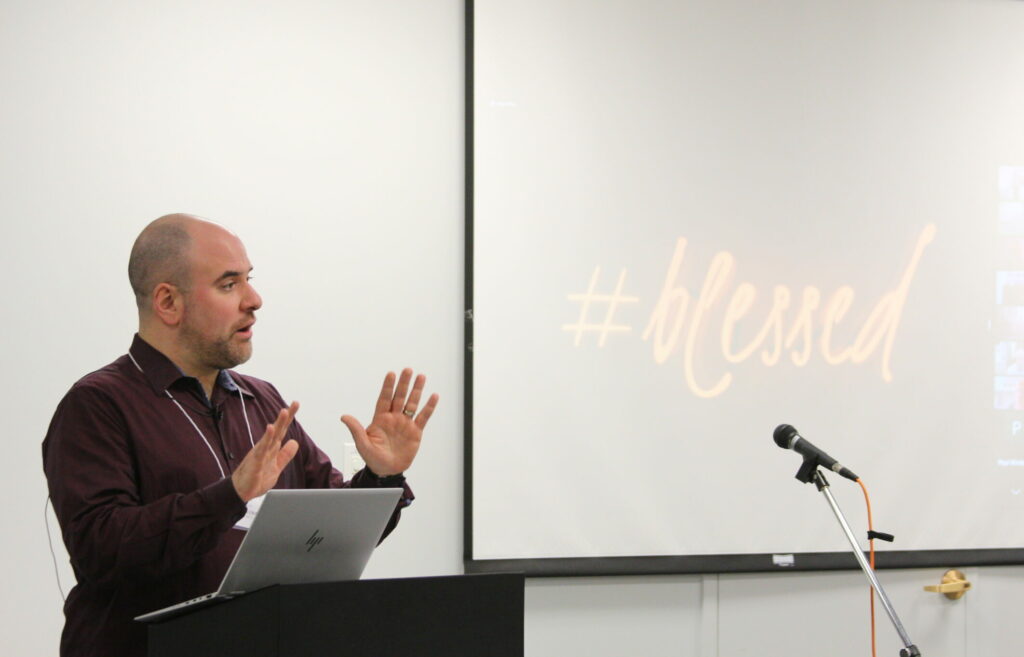Glowing Jesus, Real Sin
Co-missioners,
Matt Metevelis blessed our recent conference with a superb analysis of St. Matthew’s beatitudes. On returning home to Las Vegas he did as do we all, slipping instantly into the rhythms and habits that constitute our usual days. For Matt these habits include some steady posting on Facebook, though with a twist of sorts. Matt uses the platform not to vent or preen, but rather to think. He does this often in longer-than-usual posts that reward the time it takes to read them.
We’ve shared a couple of these posts with you over the past year or so. Today we share two more of them. They appeared within the past two weeks. One pertains to our Lord’s Transfiguration, the other to Ash Wednesday. Both illuminate the strange and wondrous Gospel we are given to trust and proclaim amid the realities of 2023. Our thanks to Matt—a hospice chaplain; a part-time pastor of a struggling downtown church—for his permission to pass them along.
Peace and Joy,
The Crossings Community
__________________________________________________________________
Glowing Jesus, Real Sin
by Matthew Metevelis
+ + +
“Glowing Jesus”: A note on Transfiguration Sunday.
“The transfiguration is about what’s coming to an end.”
A former professor of mine shared this insight on a podcast. The glory that shines on Jesus is the stuff we want to capture. The goodness, the power, the feeling, the energy, the relevance, the community—all of that realized as light that shines down upon us. “It’s good for us to be here” Peter says in Matthew’s Transfiguration text (17:1ff.). But the voice of God comes at that moment to say that the glory is not the point. Jesus is.
Peter in so many ways is the voice of the church. The voice of those who say, “We’ve got glowing Jesus here.” Some do it overtly through coffee bars and petting zoos, others do it culturally with virtue proclaiming church signs or political activism (some varieties are good, holy, and necessary, others not so much), but many do it in a much more intimate way through clustered and weighted memories and the sense that “we’re family.” All of it is the same. We’ve got Jesus. Let’s make him glow. Only then will this be good news. People will know Jesus only when the church is good news.
We pride ourselves in overcoming the medieval way of making the church good news. The idea that the church had some sort of treasury of merits, or finely tuned sacramental system which cancelled out sin and assured salvation through your participation. The church was like Littlefinger in Game of Thrones. Your man on the inside if you needed a favor.
The church as good news in the age of capitalism is not too far from this. Instead of serving as a process the church is now a product. “Get some Jesus in your life” is the way I’ve heard a lot of people say it. Going to church is good for you. You’ll get good morals, good experiences, good politics, good friends, good music, good feelings, good mental health. You name it. “It all glows here,” we say. And we say it over and over again through selfies and testimonials and social media presence and trying to make whatever we’re doing in our little corner “glow” so that people will be attracted to it. In order to keep it running it requires pastors who do poor impressions of tech CEOs laid back in appearance but savvy at the “future”, people who are actually competent behind them to clean their messes, people who bear the burdens of those people and all that, ad infinitum. The church behind this grinding human matrix is just software, full of “programs” and checklists. It’s an exhausting mess. We feel like we are gospel people because we’ve tackled the problems of the law through our theology, but we haven’t even gotten the false promises we make with the law out of our language as church, much less our hearts as the faithful.
“Jesus, it’s optimal that we are here. I would like to start three programs. A healing ministry with you. A liturgical chiseling ministry with Moses. And a bull burning laser show ministry with Elijah.”
Instead of all this, the glory that we see on Jesus is brought to an end by the cloudier, grander, and more dreadful glory of God. This is a glory that does not attract but consumes. It swallows up fancy glowing Jesus and all the things that we project on it and tells us to listen to Jesus instead. “Get up” he says. “Don’t be afraid.” Every glory ends. Read your Ecclesiastes. Vanity of vanities. Dust in the wind for you music fans. But Jesus is here. Don’t be afraid. He doesn’t glow. He speaks. He consoles. He comforts. He urges. He bears things. He dies. He rises. All of it so that we will finally take him at his word to not be afraid. All of this so that, in the moment our wildest dreams of glory end, we might wake up to the voice that is calling us.
All this said, I found my old professor’s little sentence and Matthew’s text apropos to this morning’s issues. I had to finally break to the congregation not only that we are struggling to pay bills but also that other options are fast growing limited. Our little glory may be coming to an end at the corner of 6th and St. Louis. The neighborhood is changing around us. We’ve had two break-ins in as many months. The light that shined so brightly is starting to flicker and slowly fade. We’re not going to do Lenten worship this year. We’re going to feel Lent in our very bones.
I needed that podcast today because I needed to hear that the church of glowing Jesus, the church of “what God is up to”, the church of “we’re like family”, the church of “making God’s future”, the church of “this is my church” and all the other little glories we want to tabernacle around are ending. For the places where it’s flourishing right now it’s only temporary. But the church of the Father saying “Listen to Him,” driving us to the one saying, “Be not afraid,” isn’t going anywhere. For the next blessed months we get to be glad that we’re part of it.
Please pray for us, and we’ll use our precious time to pray for you.
+ + +
Real Sin: A note on Ash Wednesday.
The law calls out sin where it is. It isn’t enough for it to decry sin as this mist that vaguely floats around pointing to nothing in particular. Sin isn’t just foreboding. It’s not just a sense that things are not what they are supposed to be.
It’s not just a social phenomenon. It’s not just a result of death and decay. In fact when we make this day about “reminding” ourselves that we’re going to die it becomes a very macabre and false absolution. “Oh, I’m just a sinner. I’m going to die. Woe is me.” That’s manufactured shame. It isn’t repentance.
Sin is a real thing that exists in real places. The voice of the law calling out sin is the voice of Nathan to David, “You are the man.” Imagine if David had said. “Oh yes Nathan. Don’t I know it! I’m under original sin and I’m going to die and I do bad things.” The story wouldn’t hit the same. Nathan made David look at his sin as a real thing, not a concept. Sin is not ash on our foreheads. It’s blood on our hands. It’s hate in our hearts. It’s shame and traumas that are inflicted on us that make us cower from relationships and community. It’s in the shrug we give as we walk by somebody in need. It’s in the resources we take from our neighbors to build our little kingdoms. It pours like rain cloud that rushes over our minds that makes us doubt the word of God and rush to the destructive idols we replace it with. It’s in the words we gave but didn’t honor, the vows we broke, and the relationships people broke with us. It’s in thousands of acts and thoughts and inclinations.
The point of Ash Wednesday and Lent is to point to all of these things. To see them for what they are. To hear them in the voice of the devil in our gospel text on Sunday. To feel the weight of them on our spirits. To know the pain we’ve heaped on others, and to feel the pain they’ve heaped on us.
But you know what? Sins are actually what we give up for Lent. They are taken from us one by one. They are pinned to Jesus like pieces of flair. Ever notice how much the important religious people like to slander Jesus? “He’s a glutton and a drunkard” etc. They’re not doing that because they are blind or misled. They are seeing the matter very clearly. And they don’t like it. It’s your sins that they are seeing on Jesus. They don’t think God wants anything to do with them. But the joke is on these people. More than just a tiny smear, Jesus wears all your sins like an old pair of sweatpants. And instead of going to Walmart he is driven carrying all of them to the divine “Goodwill” donation store called the cross to get rid of them for you. If you ask him where they went, he’ll show you the tax receipt he got from the Father that says, “Forgiven.” That’s what you’re preparing for this Lent. The cross. You are not dust. Your sins are. That’s what you’re wearing.
Thursday Theology: that the benefits of Christ be put to use
A publication of the Crossings Community


